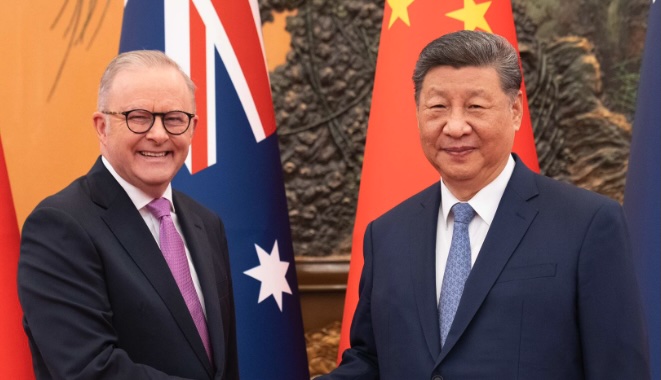Already a subscriber? Make sure to log into your account before viewing this content. You can access your account by hitting the “login” button on the top right corner. Still unable to see the content after signing in? Make sure your card on file is up-to-date.
Chinese President Xi Jinping has announced that China-Australia relations have “turned around” following a six-day visit from Australian Prime Minister Anthony Albanese.
Some shit you should know before you read: If you’re unaware, trade between Australia and China is one of the most critical economic relationships in the Indo-Pacific, with China purchasing over a quarter of Australia’s total exports, including key commodities like iron ore, coal, and agricultural products. However, despite strong trade ties, their broader relationship has been marked by a decade of turbulence. Beijing has expressed consistent anger over Australia’s participation in joint military exercises with the US, the growing presence of American military assets in the region, and major defense deals—most notably the AUKUS pact, which will see Australia acquire nuclear-powered submarines with US and UK support, a move China has condemned as a direct threat to regional stability. Espionage allegations have also fueled mistrust between both sides.

Getting into it: During a meeting in Beijing, Chinese President Xi Jinping and Australian Prime Minister Anthony Albanese vowed to stabilize and strengthen the China-Australia relationship. Xi said that the two nations had “risen from their setbacks and turned around,” noting that the relationship should be guided by “a commitment to equal treatment, to seeking common ground while sharing differences, [and] pursuing mutually beneficial cooperation.” He added that “no matter how the international landscape may evolve, we should uphold this overall direction unswervingly.” Albanese, echoing Xi’s remarks, said, “I welcome the opportunity to set out Australia’s views and interests,” and stressed that “dialogue needs to be at the centre of our relationship.”
Premier Li Qiang also met with Albanese and urged Australia to resist global protectionist trends. In a pointed reference to President Donald Trump’s trade policies, Li stated, “The development of all countries is faced with new challenges… China and Australia, as important trade partners, should strengthen dialogue and cooperation.” He added, “We hope that you will embrace openness and cooperation, no matter how the world changes.” The two leaders also oversaw the signing of six bilateral agreements in areas such as tourism, agriculture, renewable energy, and business exchange, with a joint statement committing both countries to “enhance exchanges and cooperation in areas of shared interest… and navigate their differences wisely.”
Despite the positive tone, Albanese raised sensitive issues during the meetings. He expressed concern over China’s short-notice live-fire naval exercise in the Tasman Sea, which Xi reportedly responded to by noting that “China engages in exercises just as Australia engages in exercises.” Albanese also raised the case of jailed Australian writer Yang Hengjun, who was sentenced to death on espionage charges, though he acknowledged that “no immediate outcome” should be expected.







